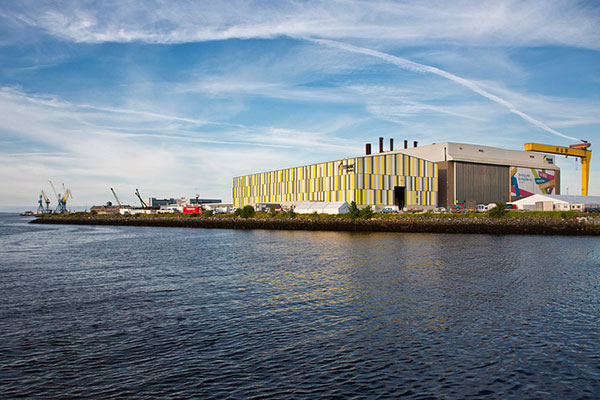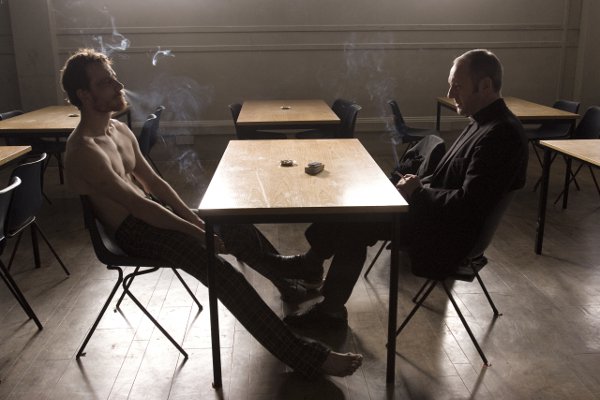“The screen industries have a role in rebranding Northern Ireland,” claims Richard Williams, CEO of Northern Ireland Screen.
Speaking last week at the annual lecture of the Queen’s University Association, London, Williams told the audience how media has become a notable success over the last decade, film and TV having paid unexpected peace dividends.
The QUAL (pronounced ‘kwoll’) is the alumni group for Queen’s graduates based in England. An association with an 80-year history, the body overlaps with promotional organisations like Invest Northern Ireland and Tourism Ireland.
Its members look to find points of positivity in the North of Ireland’s prospects, in any arena, and in Williams they had a speaker who was able to deliver.
Though in his forties, Williams appears more youthful. Casually dressed (smart jacket, open collar) and good-looking, he cheerfully represents the confident mood recently grown in the North of Ireland’s cinema, TV and all-round media.
Williams was able to outline what NI Screen has helped create over the last 10 years. A far from exhaustive list includes Closing the Ring (2008), Hunger (2008), Good Vibrations (2012) and Road (2014) in cinema, the slick-and-sleazy cat-and-mouse crime drama The Fall for TV, and the gleaming jewel in the crown that is HBO’s epic Game of Thrones.
Filmed at the Titanic Studios on Belfast’s old Harland and Wolff quayside, and at picturesque Ulster locations, Game of Thrones has become an industry unto itself (Williams estimates a £23million boost to the local economy).
Along with a quality line-up including Aidan Gillen, Sean Bean, Charles Dance and the exquisite Emilia Clarke, it includes a support cast that could populate a sizeable town. “It’s rare nowadays to meet someone who hasn’t been an extra in Game of Thrones,” Williams jokes (those seen in the background action include Martin McGuinness’ brother).
The phenomenal series has also made an improbable icon of dwarf actor Peter Dinklage, who is supposedly of Irish decent.
So popular is the gamine character Arya Stark (Maisie Williams) that Arya is now popular as a girl’s name.
Williams reckons that Titanic Studios employs 300 people directly; with another 1,000 auxiliary staff and the ripples expanding into the local economy are immeasurable. Whatever the future of the conflicted sovereignty of the six counties, the battle over Westeros is currently good for business.
Williams informs the QUAL gathering that he is heavily committed to shaping new perceptions of the North of Ireland.
Last year NI Screen announced its initiative ‘Opening Doors’, an allusion to CS Lewis and the world of imagination to be found on walking through the wardrobe. Around £43million is being invested in film, TV, animation and even digital gaming.
There are agendas for promoting both Irish language and Ulster-Scots productions. It’s hoped that Opening Doors will generate £194million. “We’re counterbalancing the Northern Ireland brand,” Williams avows, “which is usually famous for only one thing.”
Noticeably he needn’t say what that “one thing” is, nor explain further. Before recent times it was implicitly understood that North of Ireland drama had the Troubles as its single narrative theme. Anything else was obscured behind bombs, bullets and sectarian strife. This created a cultural and moral dilemma over portraying the grim reality.
For decades dramas like Gerald Seymour’s Harry’s Game (1982) or Mike Leigh’s Four Days in July (1985), though creatively powerful, unavoidably gave a depressing impression. It’s long been believed that such depictions of turmoil discouraged industry and investment.
So now it’s thought the reverse must also be true. Positive representations of the North of Ireland and upbeat productions can boost morale and improve the general outlook.
The population can be uplifted by its popular culture. Even supreme, tough movies like Hunger and Good Vibrations put a heartening slant on the Troubles, indicating the mayhem left behind and that society somehow survived.
Williams enthusiastically pronounces that NI Screen enjoys “support across the political spectrum and the business world in the rebrand process.”
Though this sounds greatly encouraging it does beg the question of how closely a cultural organisation should collaborate with business? Cultural expression should expose what’s most troubling, not comforting.
There remains deep sectarian division and social deprivation and it should be NI Screen’s position to help bring these themes to air. With that said, in early March they announced a new film drama that shows how past paramilitary actions haunt the present political scene.
The Truth Commissioner, based on David Park’s novel and starring Sean McGinley, undoubtedly has contemporary resonance and is set to appear later this year.
Certainly for now and the near-to-middling future the prospects for Williams’ endeavours look bright.
Unlike the ill-fated vessel for which it is named, Titanic Studios isn’t in danger of sinking anytime soon.
Season five of Game of Thrones is about to hit TV screens on both sides of the Atlantic. Season six is in preproduction and season seven is already being planned.
Even famed HBO flagship series The Sopranos was never commissioned that far ahead. Northern Ireland Screen is set on an ambitious enterprise and is currently on a promising course.
Season five of Game of Thrones airs on Sky Atlantic from Monday, April 13



